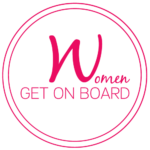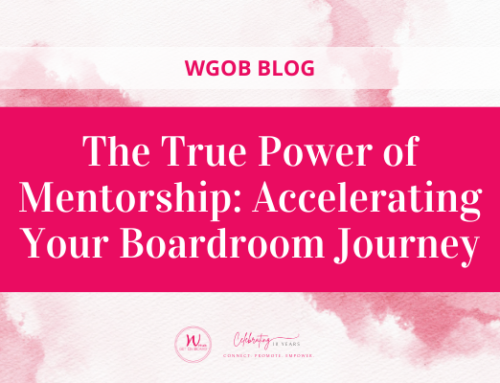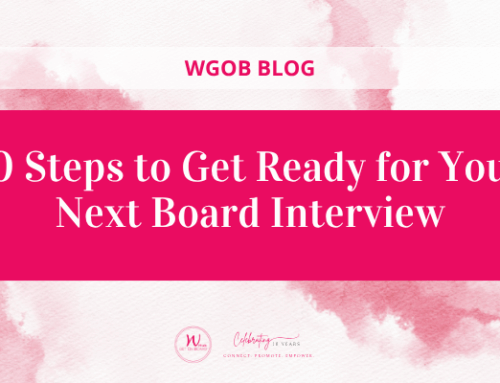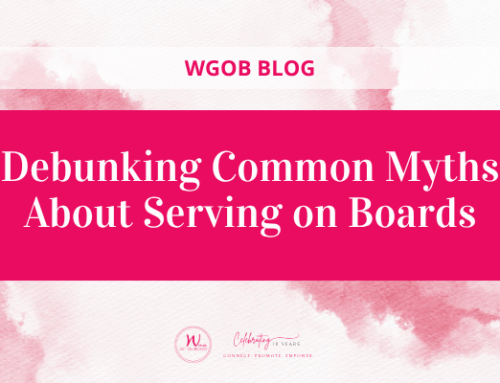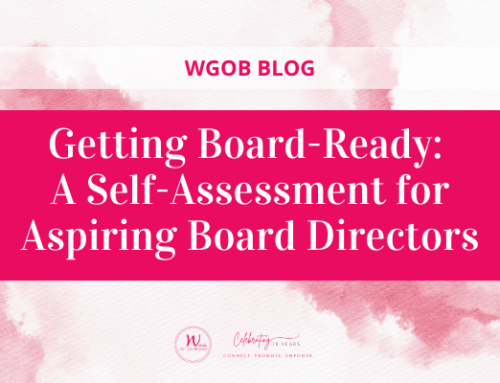
Many women are reluctant to talk about themselves. What are the keys to presenting yourself in networking?
Organize yourself on paper and see what you’re good at. You should first do a SWOT [strengths, weaknesses, opportunities and threats] analysis. Target your strengths and find those that boards are really looking for. They have to be strengths that are true so you can believe in yourself. If not, you won’t be able to convince anybody else.
You don’t have to be good at everything, but you have to find the few things that you believe you are good at. Have examples of situations where you have used those qualities and experience to accomplish something.
How did you develop your elevator pitch?
Start with your SWOT and your board business plan. Assemble your strengths and board goals in a one minute elevator pitch. And then, practice it with your friends, in small groups where you know everyone. Just say it out loud. The first time I said my goal out loud, I said it at a breakfast: “I’d like to be on the board of a publicly traded company.” I was shy to say it because it sounded like I was bragging and trying to talk too much about myself. But I found that after saying it a few times, it’s just your goal and that’s it. You have to get used to it and you really have to believe in yourself.
What networking advice do you have for women who don’t have access to higher ranking mentors and only know people in their peer group?
Have a goal. Know where you want to be in five years to understand who you need to meet to get there. Then find events where you can meet people who do that job or have those skills.
Join LinkedIn groups which are about your topic of interest, your skills or where people you want to network with go and post comments. When you feel confident, write on that topic, so you start to get known.
When I go to an event like a seminar, I often am the first to get up, say my name and ask a question. People are often shy to ask the first question, which creates an opportunity. Of course, you have to have an intelligent question, but people look at you and then they know you. It’s easier afterwards when you are mingling because they remember you. That’s a very good networking trick.
At many events there is a table of honour where the most connected people are sitting. Once they get up, go up and introduce yourself and try and get their business card. Just say, “I’m so interested in this, I’d like to get your advice and maybe I could contact you and we could have a coffee. Would it be ok if I sent you an email?” They always say yes. They give you their business card and then you follow up with an email and build like that.
Many women start getting board experience at charitable organizations for which they have a personal interest. How do you leverage that experience to progress to a paid Board position?
Find a charity that you believe in but that also gives you some of the experience that you need. Two objectives for being on a charity board are: grow your strengths and develop your network. Some charities are focused on raising money for a cause. The board work involved in fundraising may be less like the work of a paid board. There are many other types of charities that allow you to give back to the community while developing your board skills. I was on the board of a charity for entrepreneurship.
Would you recommend cold calling a board member for advice as to how to get on a board? Has anybody ever cold called you, and how did you react?
It hasn’t happened. That’s interesting. It goes to your question of women being uncomfortable asking for what they want. Ask something that you’re comfortable to ask. Don’t ask for a job. Don’t ask for a board reference or help getting on that board from someone you don’t know. Ask for advice. That was my way of doing it. “Could I meet you, could I show you my resume, could I show you how I present myself? Can you tell me what you think? What events should I attend that would help me in my board career?” People always say yes to advice. That’s a good ask.
What closing advice do you have for women starting their board journey?
Know what you want. It’s the same thing as your career. What are you good at, what do you want and what makes you have fun?
Then, build your own network. I had an event last week with a women’s network that I started myself. I started it 20 years ago because I was working in financing. I needed to know people who knew about life sciences. I wanted people to give me advice. In my network there were not a lot of people like that. But I had a few friends, two other women. We each invited three other people that we knew, and we started a breakfast club. It was not formal or structured. I have kept that network alive for 20 years. Now it’s fun because we have known each other for so long. Some of the women now have very big positions so it’s nice to have them in your network from the beginning. So, you can start a network of women your age but from a different field. It’s a good way to grow your network and have fun at the same time.
